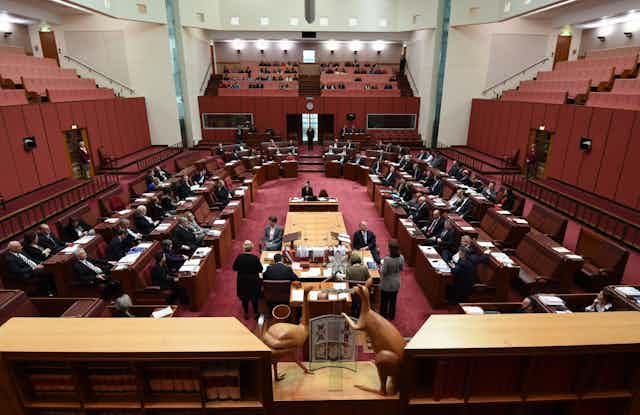For the second time in a row, a Senate election in Western Australia could end up in the Court of Disputed Returns. After receiving the fourth-highest overall group vote in WA, Pauline Hanson’s One Nation Party is seen as the favourite to secure the final WA Senate position when results are declared in coming weeks.
There is doubt, however, about the eligibility of One Nation’s lead Senate candidate in WA, Rod Culleton. It has recently been revealed he was convicted in New South Wales in March of larceny and a warrant has been issued requiring him to appear for sentencing. Culleton is appealing this conviction, which relates to a A$7.50 tow truck key being stolen from a driver who was trying to repossess a leased car.
Culleton is also facing trial in Perth next month for stealing. This charge concerns the alleged theft of a $37,000 hire car that bank-appointed receivers were trying to repossess from a friend’s farm.
For his part, Culleton doesn’t believe these issues will affect his election. However, Section 44 of Australia’s Constitution suggests he is wrong – and that he is presently ineligible for election.
What’s in Section 44?
Section 44 sets out a range of criteria under which people are:
… incapable of being chosen or of sitting as a senator or member of the House of Representatives.
This includes any person who:
… is attainted of treason, or has been convicted and is under sentence, or subject to be sentenced, for any offence punishable under the law of the Commonwealth or of a state by imprisonment for one year or longer.
In relation to Culleton, both the NSW and WA charges potentially enliven this section. The threshold question isn’t what sentence an individual actually receives, but rather what the maximum penalty is for the particular offence. Both larceny in NSW and stealing in WA attract maximum penalties greater than imprisonment for one year.
The second question is whether Culleton has been:
… convicted and is under sentence, or subject to be sentenced.
With the exception of somebody “attainted of treason” (who is permanently disqualified), a person is disqualified only while they are serving their sentence or awaiting sentencing. This was confirmed in a 1987 High Court case, when it was clearly stated that the disqualification ends once a criminal sentence has been served.
This is the reason, incidentally, that Derryn Hinch is eligible to sit in the Senate despite having previously served time in jail.
Given there has not yet been a conviction, the WA charge is not disqualifying – although it may be in the future were Culleton to take his seat in the Senate and then subsequently be convicted.
However, the NSW conviction does disqualify Culleton – he is “subject to be sentenced” for an offence with a maximum penalty greater than one year.
Given the basic facts of the case, it would seem highly unlikely that Culleton would actually be sentenced to imprisonment. He may also be successful down the track in appealing his conviction. Neither of these things is relevant, however, if he is ineligible at the critical time.
What, then, is the critical point in time? The High Court, sitting as the Court of Disputed Returns, has considered the precise meaning of “incapable of being chosen”. In a 1992 case, the majority took a broad view, finding it refers to:
… the process of being chosen, of which nomination is an essential part.
If this view is followed, then Culleton is already ineligible to be chosen – he was convicted and awaiting sentence at the time of his nomination.
Alternatively, one justice in the 1992 case took a narrow interpretation and found that “chosen” referred only to the declaration of the poll.
This interpretation might provide Culleton with a glimmer of hope, provided he could somehow either successfully appeal his conviction, or be sentenced and complete that sentence before the declaration of results in the coming weeks. This does not look likely.
What’s next?
If Culleton is deemed ineligible, it has been suggested this could result in a casual vacancy being declared under Section 15 of the Constitution, or even a supplementary Senate election in WA. But neither of these scenarios appears likely.
Based on precedent, the most likely outcome is that the second-listed One Nation candidate would effectively be treated as though they were the lead candidate.
In that 1988 case, the High Court, sitting as the Court of Disputed Returns, determined that the ineligibility of Robert Wood to be elected as a NSW senator (based on his British citizenship) did not result in a casual vacancy or supplementary election, but rather a vacancy that could be filled by further counting of the existing ballot papers.
In the present situation, this would mean that if One Nation did win the final WA Senate spot, Culleton’s brother-in-law, Peter Georgiou, would be declared elected in his place.

